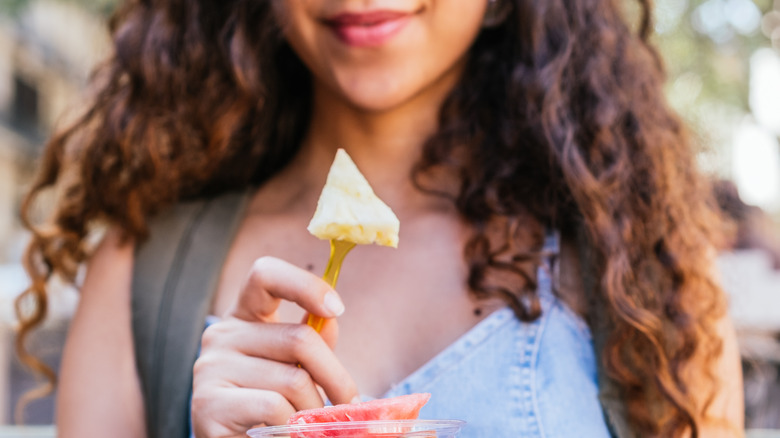Why Does Your Tongue Tingle After Eating Pineapple?
Pineapple is neither hot nor spicy, so why is it that after snacking on a few juicy slices, our tongue starts to burn and tingle as if we've just eaten a zesty pepper?
Although scientists don't have a definitive answer as to why this occurs, research points to a particular enzyme found in pineapple known as "bromelain" (via SELF). While bromelain is essential in our body's ability to break down proteins, this enzyme can also break down the keratin within the protective mucus lining of our mouth. "Our oral cavity doesn't have [enough] natural protection, so the proteolytic enzyme in pineapple can actually start to react with the oral mucous layer," Dr. Paul Takhistov, associate professor of food engineering in the department of food science at Rutgers, explains to SELF. Additionally, pineapple harbors a pH level ranging between 3.2 and 3.5. Couple pineapple's high acidic levels with the effects of bromelain, and you have a recipe for tongue-tingling irritation.
How to reduce tingling sensations from eating pineapple
Perhaps you're wondering: If the bromelain in pineapple has the potential to break down our mouth's mucus lining, can it also damage the body in other ways? Experts say that in normal, snack-sized amounts, not so much. However, author Maria Gloria Lobo of "Handbook of Pineapple Technology: Production, Postharvest Science, Processing and Nutrition," notes that handling pineapple in exceptionally large quantities, such as in cases of mass production, can pose risks to our skin (via Yahoo! Life). Without adequate glove protection, the bromelain in pineapples may prompt rashes or fingerprint loss. Yet this is not the case for a standard serving of pineapple.
If snacking on pineapple has become too bothersome to bear, experts suggest some ways to make this refreshing fruit more palatable. According to PopSugar, some people swear by leaving a pineapple out overnight to reduce the tingling sensation. Instead, however, try cutting out the stem, which runs through the middle of the fruit. The stem is where you'll find the highest levels of bromelain. Therefore, you may be more likely to experience irritation from pineapple chunks located closer to the stem. Alternatively, consider cooking your pineapple slices (via SELF). Opting for grilled pineapple, or giving it a dip in some boiling water first, will help rid the fruit of its tongue-tingling enzymes.


